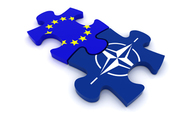As U.S. Defense Secretary Chuck Hagel settles into Brussels this week for the NATO defense ministers meeting, he should avoid using the oft-repeated but incorrect American criticism that Europeans do not spend enough on their defense. The truth is exactly the opposite: In spite of the recent cutbacks, NATO's European members' annual defense spending tops $250 billion dollars, almost equal to the U.S. defense budget prior to 9/11. A huge sum considering that the Europeans have no interest in policing the world.
It is not that the Europeans do not spend enough on defense, they just spend it inefficiently, on duplicate military procurement programs and acquisitions that benefit individual countries rather than contribute to a Europe-wide defense profile.
Can the Europeans ever overcome their parochial defense thinking and construct a European defense capability? I believe they can, but it will take a dose of straight talk and tough medicine from Washington to point them in the right direction.
NATO was set up 64 years ago to defend Europe against the Soviet Union. The North Atlantic Treaty that created the Alliance hitched the United States' military might to the defense of Europe and ring-fenced the Soviet empire until it collapsed, leaving Europe without any significant threat. Then, thanks to European industry and NATO's defense umbrella, Europeans rebuilt their countries from the devastation of World War II and created the European Union -- one of the largest economies in the world.
But NATO also left two corrosive legacies on the transatlantic allies: Europeans became accustomed to getting their defense on the cheap via the U.S. taxpayer; the United States, has drunk deeply from the jug of "leader of the free world" and has difficulty passing even a regional baton to the Europeans. The result: today's anemic European security establishment.
Witness the Libyan war, in which European military forces could do little against a middling power in their back yard until the United States deployed its high tech weaponry to bail out its allies at a cost to the U.S. taxpayer of $1 billion.
Given America's economic doldrums, its looming defense cuts, and the growing focus on Asia, this unbalanced division of labor in which the United States is permanently responsible for the protection of 26 European countries cannot continue. As former U.S. Defense Secretary Robert Gates told the Europeans in June 2011:
The blunt reality is that there will be dwindling appetite and patience in the U.S. Congress -- and in the American body politic writ large -- to expend increasingly precious funds on behalf of nations that are apparently unwilling to devote the necessary resources or make the necessary changes to be serious and capable partners in their own defense.
Twenty years ago the EU set up its Common Security and Defense Policy to create an autonomous military capability for Europe. Using CSDP, the EU has deployed some thirty overseas missions -- some of them quite robust, such as the brigade (3,700) size EU force sent to Chad in 2008 at the request of the United Nations. The mission was sustained in the middle of Africa for some 14 months and protected half a million refugees, using firefights when necessary.
These deployments demonstrate what can be achieved by Europeans when they decide to define and defend their collective interests. But, for a variety of reasons, including strong initial objections from the United States to the European defense initiative, a fear of rocking the NATO boat and angering its American underwriters CSDP has been marking time even as NATO continues to dissolve into a mechanism for generating coalitions of the willing, as Libya demonstrated. Fewer than half of European NATO members participated in the Libyan war, and less than a third were willing to participate in the strike missions.
It is time to re-think the relationship between the EU and NATO, and the upcoming December 2013 meeting of the European Council (the EU's top-level decision making body) to address its Common Security and Defense Policy presents both sides with a powerful opportunity to do just that. Defense Secretary Hagel should seize the moment and put forward an agenda to move the NATO-CSDP conversation forward. To generate debate he should propose an agenda along the following lines:
- The U.S. expects that within a specified number of years responsibility for the defense of Europe and its periphery will be assumed by the EU, with Americans acting largely as force enablers for a transitional period.
- The United States will progressively turn over the leadership of NATO to the EU by replacing Americans with Europeans in key NATO positions.
- NATO's "Board of Directors," the North Atlantic Council, was designed for a world without the EU and consists of permanent representatives from individual European countries. It should be recast to include one representative each from the EU, U.S., Canada, and from each non-EU member of NATO such as Norway and Turkey. This reformed body would serve as the transatlantic military link, while the EU's Political and Security Committee would assume the NAC's functions for Europe area operations and decisions.
It is time for Europeans to stop believing that the transatlantic defense and security equation cannot work without U.S. leadership and time for the U.S. to accept that it does not have to lead everywhere in the world, and certainly not in Europe where its closest and richest allies dwell.
NATO has been the jewel in the transatlantic crown, but it is time to tailor it for the new century. Secretary Hagel should seize the opportunity to do so.
